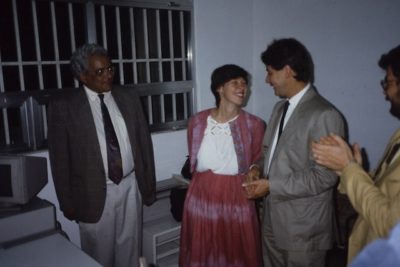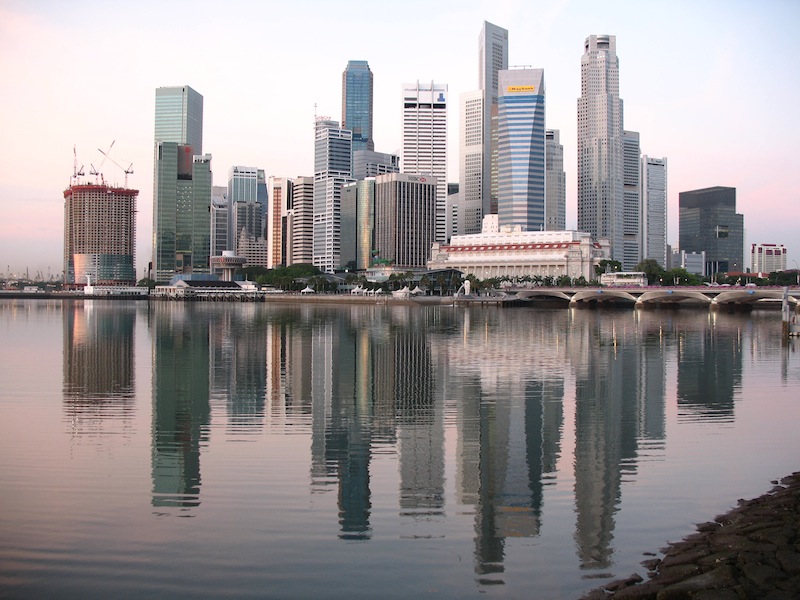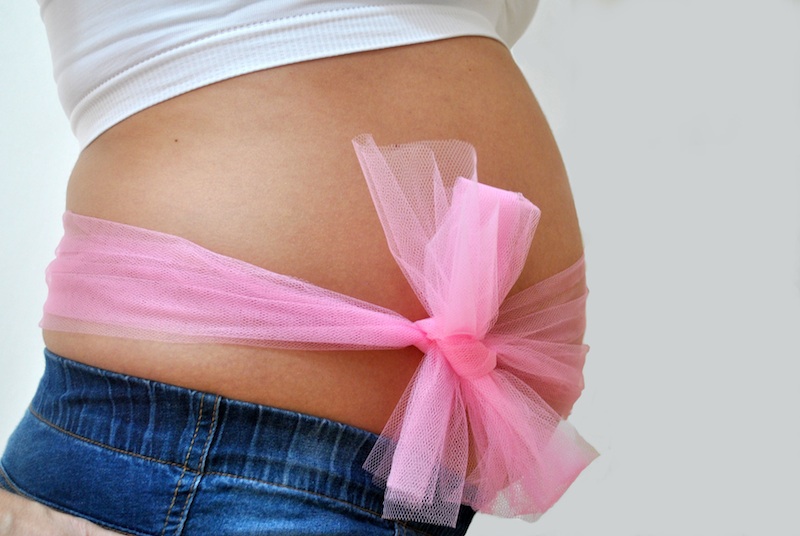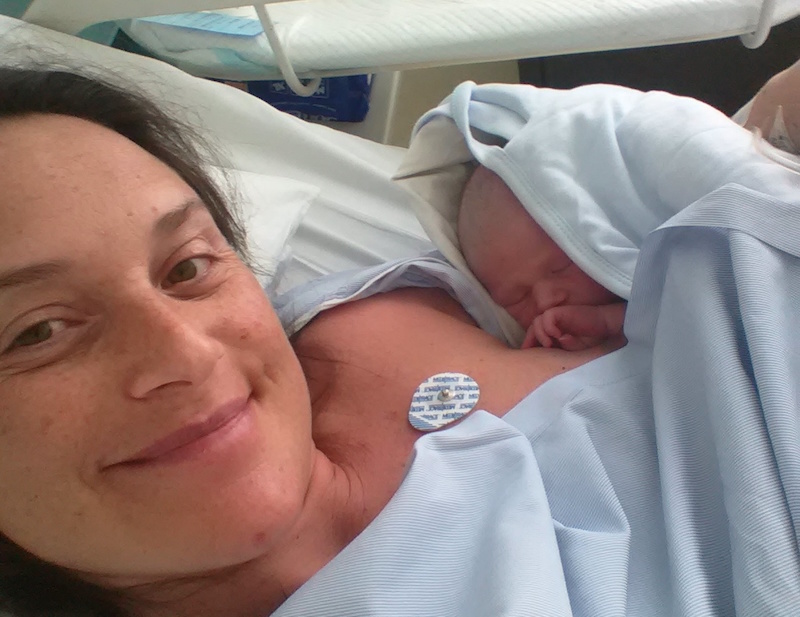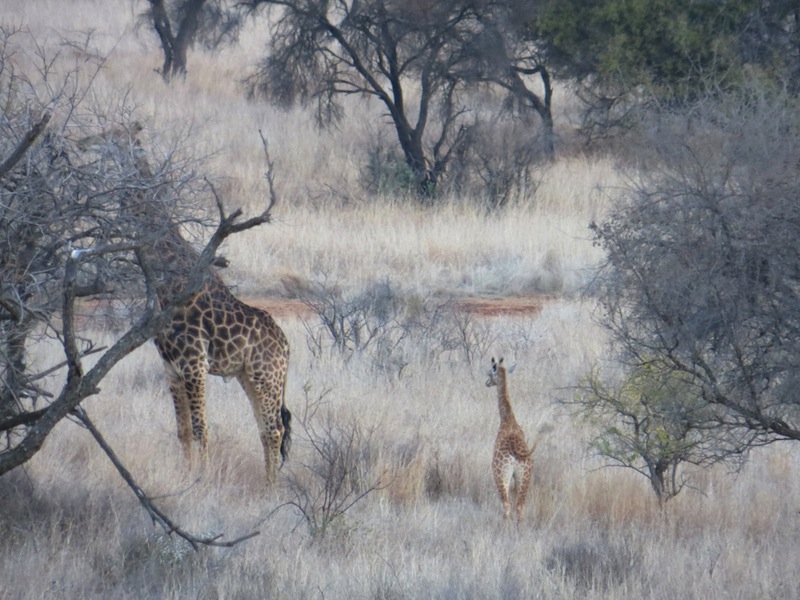
Claudiaexpat tells us about her African pregnancies.
Even though 25 years have passed since I clasped a white plastic stick telling me that I was pregnant in a small isolated town in Angola, the memories of my African pregnancies are still very much alive.
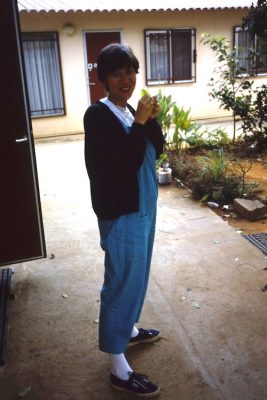
Me pregnant in Angola
I conceived my first child in a UN compound in Lubango, Angola, during a humanitarian mission in a country tormented by almost twenty years of civil war, and where living conditions were anything but easy.
War hadn’t touched Lubango directly. The fighting stopped 50 kms outside of town. The repercussions were bad though. Lack of food and no jobs meant that spirits were low and travelling beyond a certain point wasn’t permitted. Every day we saw a continuous flow of soldiers maimed by landmines in the town. Sanitary conditions were virtually non-existent.
Foreign doctors already on the ground treated expats, and in more serious cases, evacuation was the only option as the one public hospital in Lubango was a health hazard in itself. But in a country torn apart by war, medical evacuation wasn’t always immediate or forthcoming since flight patterns were dependent on the mood of the warlords.
Looking back I now realize that I acted under the umbrella of courage and youthful irresponsibility, making big deeds possible. The conditions were far from ideal to begin a pregnancy but we wanted children badly and since our work determined where we lived, there was no guarantee that any place later on would be any better. After all, I was young, healthy and optimistic and so full of happiness at being pregnant.
Even in my complete state of irresponsibility, the pregnancy went very well.
I had brought pregnancy-testing kits with me from Italy. When I used one of these kits and it showed positive we took advantage of a trip to Namibia where we occasionally went to buy equipment. There we sought advice on how to face pregnancy with little assistance and I had a complete medical check-up. I remember being totally exhausted on the long trip from Lubango to Windhoek but I also remember with utter clarity lying on a clean, perfumed hotel bed in the Namibian capital after hours and hours of travelling in the dust and heat. The medical check showed that I was in glowing health and my blood tests were perfect. I happily faced the return journey to Lubango.
Even in my complete state of irresponsibility, the pregnancy went very well. I was in good shape and had no nausea or symptoms that might slow me down. I continued to work full time and still did tasks considered unsuitable for pregnant women. I climbed on high piles of wheat bags to count them (and was caught by a concerned colleague monitoring my acrobatics as I slipped to the floor!) I fumigated warehouses with chemicals that even under ordinary circumstances, exposure was strictly monitored. I drove my 4 x 4 over potholes in the road as I guided food distributions. For six months I saw an Argentinean gynecologist who asked me how I felt at every visit and measured my growing belly with a tape measure. I could feel my unborn child moving inside me and knew he was healthy and tried my best to eat well on the limited variety of foods in town.
When I was six months pregnant, I went back to Italy. I wonder how Alessandro took to the sudden change in lifestyle. I was now under the protective custody of a group of doctors who took an extremely preventative and protective approach to pregnancy, quite the opposite of my almost fatalistic attitude.
I was hospitalized immediately with the discovery of a low-lying placenta. I ended up in a ward full of women with ‘at risk’ pregnancies. Far from the dusty African roads and questionable facilities in Lubango, the Macedonio Melloni hospital in Milan encouraged health personnel to inform patients of the harsh realities of their ‘at risk’ status and I was terrorized by visions of me bleeding profusely in the aisles.
Mattia is free and a little wild in nature and I like to think that’s because of where he was conceived.
I was scolded for walking around too much by one young doctor (on my way to another room adjacent to mine where a poor woman was on the verge of depression because of nightmares brought about by the unrelenting pessimism of the staff). That very day, I discharged myself from the hospital and enjoyed the rest of my pregnancy holed up in the historic centre of Milan, reading Proust and gorging on malt yoghurt.
In mid December, when the ground was sprinkled with snow, Alessandro was born. I had found a more welcoming gynecologist to assist in Alessandro’s birth at Buzzi hospital. He still refers to me as “the African” but I respect him dearly as I have the sweetest memories of those days.
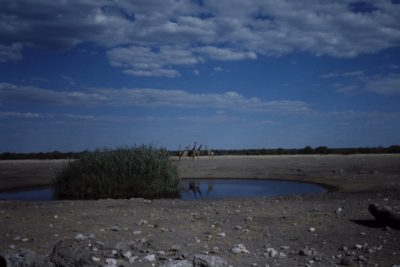 My second son, Mattia, was also ‘made in Africa’ but this time in the Namibian desert during a holiday whilst we were living in Brazzaville.
My second son, Mattia, was also ‘made in Africa’ but this time in the Namibian desert during a holiday whilst we were living in Brazzaville.
We were staying in a rented bungalow and the nights were silent and dark.
Mattia is free and a little wild in nature and I like to think that’s because of where he was conceived.
Everything seemed unproblematic this time, and although Brazzaville was definitely more organized than Lubango, I wasn’t working and took things a little easier. Dr Iloki was my gynecologist – very professional and a wonderful person with lots of experience. He had facilities for ultrasound and I would definitely recommend him if you happen to be in Brazzaville, and pregnant. The only thing lacking though was an efficient post-natal unit so we decided to have Mattia born in Italy.
The African attitude towards pregnancy is definitely more relaxed. I was soon sent home after promising that I wouldn’t be dancing the tango any time soon.
I came to Italy for the birth at seven months during which time I had several small hemorrhages. The last one, at five months, was the strongest and came at a time when my husband was away travelling. I clearly remember that I used extreme caution getting into a taxi to take me to Dr. Iloki but at the time it felt as though I was heading to the gallows. Dr. Iloki assured me that everything was OK and again I learnt that I had placenta previa. The African attitude towards pregnancy is definitely more relaxed. I was soon sent home after promising that I wouldn’t be dancing the tango any time soon.
The days after that visit were full of magic. I woke every morning and saw the flowing river Congo in the distance. I spent a lot of time with Alessandro, telling him about his baby brother. Our 80 year old cook Raoul, who was almost blind but saw much more with his heart, prepared delicacies that made me gain weight but which certainly contributed to Mattia’s good nature. My expat friends fussed around me in a warm embrace of friendship, following closely my ever-changing body. One of my best friends fell pregnant a little after me and we would spend hours on Sunday afternoons, floating on the water of one of the many tributaries of the Congo, our bellies just breaking the surface.
When you are expecting, you are never really abroad because with a child inside you, you are at home anyway!
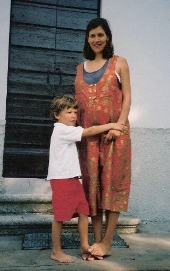 Because of the placenta previa, I was forced to take a period of total rest once I returned to Italy. You can see me in the picture with Alessandro in the house where I was resting. Mattia was also born at Buzzi hospital, but under far less romantic conditions. I had been hospitalized for frequent blood loss and one night, a shift doctor experiencing one of my very strong hemorrhages, decided to rush me into theatre for a cesarean section. I was certain Mattia wanted to stay a while longer inside my belly because I was convinced he wanted to be born in Africa!
Because of the placenta previa, I was forced to take a period of total rest once I returned to Italy. You can see me in the picture with Alessandro in the house where I was resting. Mattia was also born at Buzzi hospital, but under far less romantic conditions. I had been hospitalized for frequent blood loss and one night, a shift doctor experiencing one of my very strong hemorrhages, decided to rush me into theatre for a cesarean section. I was certain Mattia wanted to stay a while longer inside my belly because I was convinced he wanted to be born in Africa!
Whenever I get asked for advice from young women today about having a baby abroad, I always say the same thing: when you are expecting, you are never really abroad because with a child inside you, you are at home anyway! All that’s really needed are large doses of courage, optimism and trust with a keen ability to listen to your instincts. I always knew that I wouldn’t consider giving birth in those African countries simply because of the complications I experienced. I am so glad that I am still here today to share my experiences with you about my wonderful African pregnancies.

